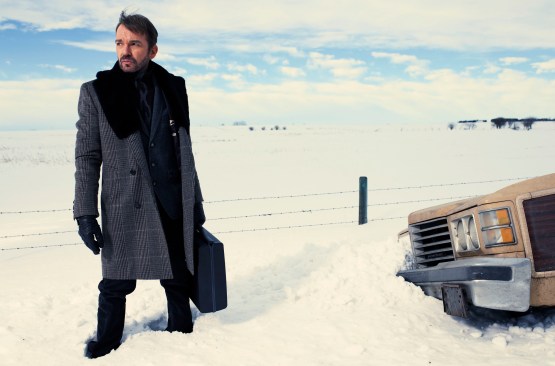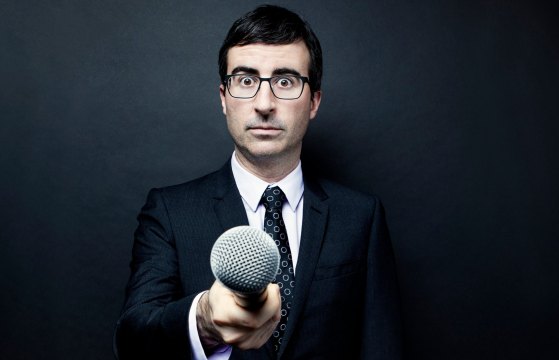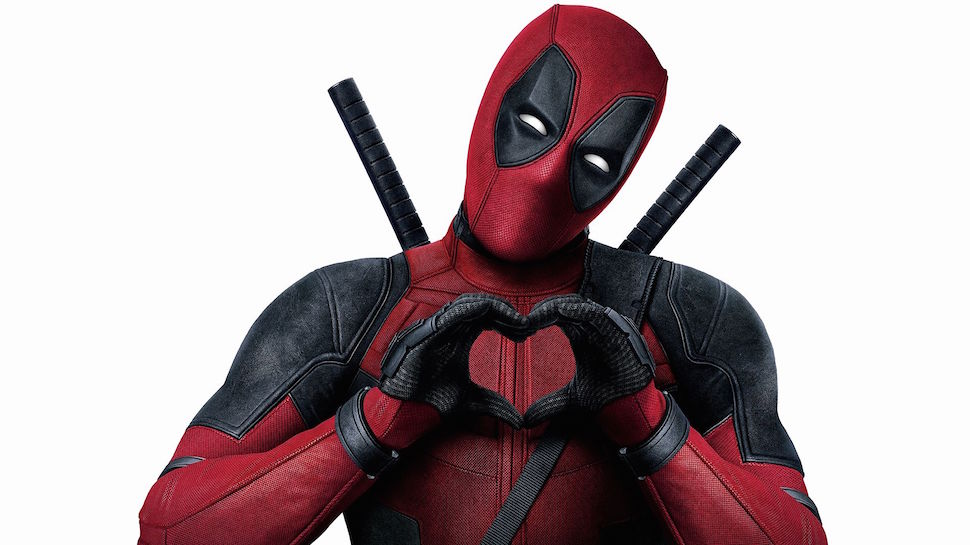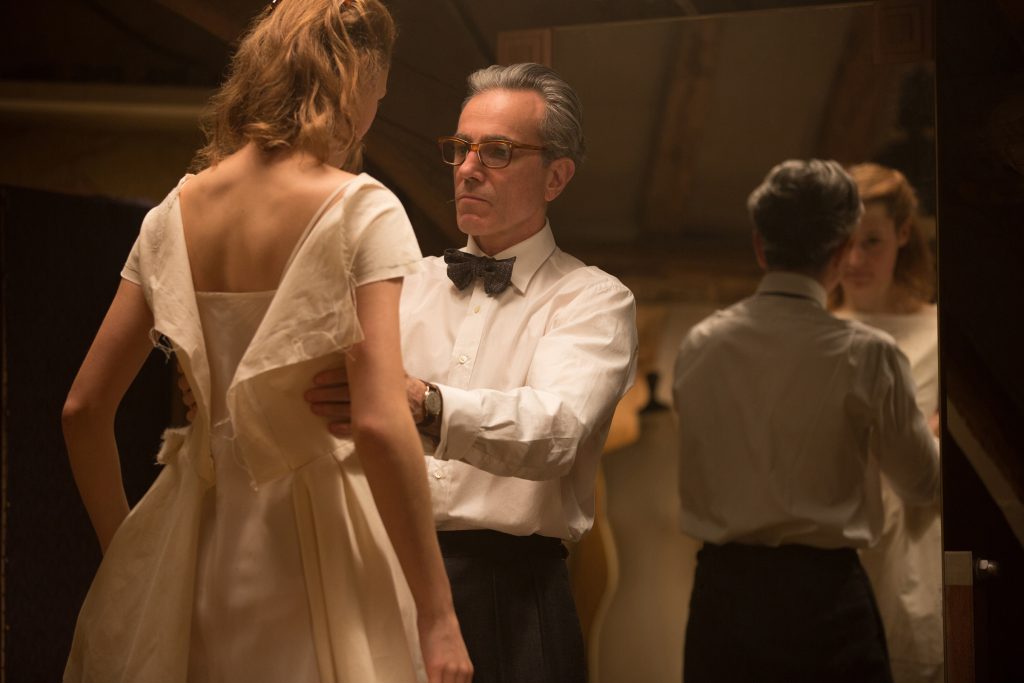by: L.P. Hanners, Chris Thompson, and Michael Shields
Across the Margin digs deep, unearthing its choices for best television shows of 2014….
We live in The Golden Age of Television, or so we keep hearing. The truth of the matter is, it’s beginning to feel a bit overwhelming, all this quality programming. In fact, its reached a point now where we need another show to enthusiastically watch like we need a hole in the head ((More than 145 original scripted series and miniseries aired in 2014.)). But if we don’t keep up, well, we just might miss the next big thing, right? Admittedly, we here at Across the Margin suffer from a crippling case of FOMO ((Fear of Missing Out)). Always have. Always will. So, we dig in. We binge watch. We make our DVR earn its money. And because of this we feel extremely comfortable when it comes to discussing the quality of television programming available today.
So with apologies to House of Cards, Arrow, The Colbert Report, Orange is the New Black, The Walking Dead, Masters of Sex, The Knick, BoJack Horseman, The Killing, The 100, Louie, Veep, The Affair, The Bridge, The Roosevelts, You’re the Worst, and especially Silicon Valley, Peaky Blinders, Broad City, and Orphan Black (How’s that for an Honorable Mention list!!!!), Across the Margin presents it’s Top Ten Television shows of 2014….
10. Sonic Highways
Dave Grohl, the phenom drummer, inspired songwriter, former member of Nirvana and current leader of the Foo Fighters, took it upon himself this year to curate a class on the history of American music. While recording the latest Foo Fighters album, entitled fittingly enough, Sonic Highways, Dave took his band into recording studios throughout the country, and while doing so, gave us a tour of modern America’s rich musical history. Whether introducing HBO’s audience to legendary Fugazi frontman Ian McKay in Washington D.C., discussing the roots of psychedelic music with the illustrious Roky Erickson in Austin, or collaborating with the Preservation Hall Jazz Band in New Orleans as part of a live performance with Trombone Short, Sonic Highways is an eye opening and informative musical buffet. Throughout the course of Sonic Highways, Grohl acts as more of a fan of the industry rather than a bona fide rock star, which he surely is. Enamored with the musical roots of rock and roll, and fascinated with tales of the more transcendental moments in rock history, Grohl enthusiastically pulls back the curtain on what has inspired him to be the man and musician he came to be. While Sonic Highways is a hearty feast for the musically obsessed, it is far from just being a television show for music geeks only. In fact, Sonic Highways acts as the perfect introductory course into to the music that really matters in America, not the loutish sounds clogging the airwaves and reigning over the top of the Billboard Music Charts.
Essential Episodes: “Washington D.C.,” “Austin,” “New Orleans,” and “New York.”
9. Rectify
Rectify is terrifying. A television program which examines the physical and emotional toll of two decades spent on death row isn’t for the faint of heart. And this psychologically affecting drama has only intensified as it has meticulously slid into its second season’s groove. The show has always taken its time. In an attempt to let the viewer in on the authentic inner workings of its scrupulously-crafted, complicated characters, it goes to extreme lengths to fill out each character’s psychological backstory. Rectify’s creator and showrunner, Ray McKinnon, has said, “Rectify is about being alive.” And being alive isn’t always easy, no more so than within Season 2, when Daniel’s (Aden Young) prison flashbacks finally begin to reveal the type of mania and anger that may imply he does have the capacity to commit the atrocious murder for which he is accused. Rectify is one of those shows where the cynics could declare that very little happens, yet those who allow themselves the gift (and curse!) of emotional investment are drawn deeply into the psychotic chaos of dealing with unimaginable circumstances. Aden Young is one of the finest actors on television, and we look forward to the moment he receives the credit he deserves. It cannot be long now, as Rectify’s second season felt more self-assured and complete than its first season, providing well-founded promise for the future of this overpowering treasure.
Essential Episodes: “Running with the Bull,” “Donald the Normal,” and “Unhinged.”
8. Boardwalk Empire
HBO ended Boardwalk Empire with one of the most poignant and emotional send-offs witnessed on television in a long time. Our beloved emperor Nucky Thompson was stripped of his clothes, literally, as he swam out amongst the crashing, grey surf of the boardwalk in the series’s perfect concluding episode. Existing in a state of duality as his death fast approached – one that revisited those same pounding waters as a young boy, striving to snatch a golden coin (and the riches it symbolized) as it plummeted towards the waters darkened depths – we learned that our king of the boardwalk was after all, only human. And the worst kind of human at that. One who when stripped bare, revealed to us the depths to which our anti-hero would go to achieve that which he desired most, an empire of his own. With the divulgence of Nucky’s original sin and his first crime – the offering up of a young and eager Gillian Darmody to his mentor and known molester of girls the Commodore – we learned in the pivotal moment of his death that he was lost from the start. That all he had endeavoured and fought so boldly to attain was for naught. For the essential message of Boardwalk Empire, of which there were many to behold, was simple: crime does not pay. All manner of Boardwalk’s characters arrived at this realization as they came face to face with this message, but none learned it harder, or suffered with their sins as long as the enigmatic, Nucky Thompson.
Al Capone: Tell ’em why you’re here, George.
George Raft: We’re doing a crime picture.
Al Capone: Set in Chicago.
Paul Muni: That’s right.
Al Capone: About?
Paul Muni: Kind of a Shakespearean drama. Man’s rise and fall.
Al Capone: And he gets it in the end, right?
-Boardwalk Empire, Season 5
Essential Episodes: “Devil You Know,” “King of Norway,” and “El Dorado.”
7. The Americans
It’s the 1980s. Ronald Reagan, the actor, has just been elected president. Cars are big. The music is, for the most part, bad. Russia and the United States are locked in a dangerous dance that at any moment could end in nuclear war and their mutual destruction. The Cold War is a very real thing and lives and victories are won and lost in the delicate game of international espionage. With The Americans, this game has arrived on the soils of the United States as Philip and Elizabeth Jennings, two KGB spies posing as an American married couple living in Washington, DC., try to execute their pro-Russian agenda behind enemy lines. But The Americans, now in its second season, isn’t just about spying and the Cold War. It’s a show that is also very much about marriage and the struggles and questions that every long-running relationship has to contend with and oftentimes face just to make things work. And therein lies the genius of the show. It is as if the shows creator and executive producer, ex-CIA officer Joe Weisberg, had the realization that the sort of things that make spying so complex and demanding are the same things that make marriages so difficult at times. Throughout The Americans, The Jennings (played convincingly by Kerri Russell and Matthew Rhys) must constantly ask themselves the sort of questions that a spy must ask: Can I trust this person? Will this work? Is this someone that I can bluff? But as you dig deeper into the series, you begin to realize that these also are the sort of questions Philip and Elizabeth are asking each other as they try to understand if their relationship (and love) is something that is real, or like everything else that they do, fake.
Watching these two worlds intertwine and then rebound off of each other as this gritty and unquestionably dark drama unfolds has made for some truly captivating, and exhilarating television to behold. Whereas Season 1 of The Americans introduced us to all the suspense and action (and wigs!) that the show’s vibrant and dynamic storyline could produce, Season 2 has begun to dig deeper into the complexities of living these dual lives. And the episodes have such layers! Oftentimes, we are watching a performance within a performance within a performance and it’s all we can do to not leap right up from our seats and yell at the television, “It’s a trap!” Ultimately, we all know how the Cold War turned out, but as we follow our favorite anti-villains, The Jennings, it becomes abundantly clear that their cultural differences and misunderstandings of the information they are given, set against a backdrop of fear of discovery, often causes them to overreact, with real-life consequences. But what we keep hoping for as this spy game unfolds, is that their KGB-arranged marriage becomes more than just a rouse. That as they spend more time living, and raising a family as Americans, that they will fall more in love with each other. Ultimately becoming more human, more alive, and less like the mindless robots the KGB has programmed them to be.
Essential Episodes: “Comrades,” “Martial Eagle,” and “The Echo.”
6. Mad Men
It’s hard to think of another show that faces more pressure to succeed than Mad Men. Since 2007, Matt Weiner has stuck to his guns, never yielding to network notes or popular consensus. Don Draper’s magic and ingenuity has been fading since Season 4. All of this embattled man’s problems have unraveled in ways unimaginable, but Season 7 began with a view from rock bottom. Then wisdom guided Don towards a guiding light. He found a different version of himself, a better version. “Put in the work,” Freddy Rumsen said to him. Don took this sage piece of wisdom to heart, and began to change. Alongside Don’s journey of rediscovery, we watched as Roger pulls what family he had left back together. We cheered as Joan became the woman she thought she wasn’t allowed to be. We cringed as Ken and Ted and Megan fell from grace, and as Ginsberg fell even harder. We beheld the first moon landing, and Bert Cooper’s final moments. But the most effective of these ch-ch-ch-changes was seeing Peggy and Sally, by their own will, learn to forgive Don. “A Day’s Work” ends with a Sally and Don moment so touching and so meaningful that it could have easily played as a series finale. Equally as riveting was the scene in the mid-season finale, “Waterloo,” when Don defiantly has Peggy perform a pitch that was meant for him. It was the student-becomes-the-teacher moment we’ve all been waiting for since the series began. And it didn’t disappoint. One can only imagine where this newfound dynamic can go for the final episodes. The first half of Mad Men’s final season was essentially about learning to jump off the high dive. Don put in some serious spiritual elbow grease that just didn’t seem feasible from such a tortured man so late in the game. Mad Men’s final season up to the mid-break saw Don’s entire sense of motivation shift, and the only question left to ask now is whether or not there are anymore demons from his past left to be confronted. We hope so. But if not, in the end, all we want to really see is if Don can figure out who he is, so he can finally stop pretending.
Essential Episodes: “Waterloo,” “Field Trip,” and “A Day’s Work.”
5. Game of Thrones
When The Sopranos was at its pinnacle, far too much attention was given to when someone was “whacked.” It seemed that what became consequential within the scheme of the mobster series’s illustrious storytelling, was the shocking deaths, more so than the complex and acute character examinations. We fear the same fate, in terms of public regard and hype, is happening with Game of Thrones. While The Red Wedding acted as a violent and shocking close to Season 3, and Joffrey’s ultimate demise, The Mountain squeezing Oberyn’s head to a juicy, eruptive pulp, and Tyrion enacting revenge for his father’s contemptuousness while he sat upon a different kind of throne in Season 4, provided unforgettable and dramatic television, it was the more subtle and poignant moments that unfolded across this most current season that made Game of Thrones so special this year. Like the moment that Oberyn, The Viper, passionately explained to Tyrion the vivid details of their first encounter many years in the past (“I told Cersei, that’s just a baby. And she said, he killed my mother. And she pinched your little cock so hard, I thought she might pull it off.”). Or the gut-wrenching philosophical heart to hearts between Jamie and his jailed brother leading up to his trial by combat. Or even, the Mother of Dragons finding justice for the murdered slave children of Meereen by nailing one hundred and sixty-three slave-masters to wooden posts. Well, this last one wasn’t so subtle, but it was in these highly-affecting encounters, where emotional bonds and enduring wounds bubbled to the surface that served to heighten the tension of those colossal water-cooler moments. Season 4 presented the notion that there were deeper motivations to the omnipresent cruelty abound, and far more intrigue and deception to our favorite characters than we ever imagined possible. And there was hardly a more engaging hour of television this year than “The Watchers on The Wall,” ((The only thing that comes close was True Detective’s defining episode “Who Goes There.”)) when the Wildlings finally made their bold and brutal move on The Wall.
Essential Episodes: “Mockingbird,” “The Watchers on The Wall,” and “The Laws of God and Men.”
4. Fargo
The murder-mystery film of the same name is a modern classic. From the television shows very beginning, Alison Tolman and Martin Freeman’s similarities to Frances McDormand and William H. Macy serve as the welcome mat of FX’s Fargo. I’m sure we all thought we knew where this show was headed and like us, you were watching with one foot out the door, ready to part ways at the first sign of anything inferior to the original. But that all changed the moment Lester picked up the hammer. Fargo’s surprises continued as the season carried on to our very delight. In fact, the show became so likable that virtually no one had anything bad to say about it. The television version of Fargo has a lot more time to play with and thus, is much more personal than the film, and the subject matter is broader as well. The original film leaned heavily on dark comedy to insure its greatness, but the show relies on the slow cook of its lively and engaging storyline, taking full advantage of the range of writing and acting abilities at hand. Billy Bob Thornton absolutely triumphs as the villainous mastermind Lorne Malvo, reminding us all that he’s much more than just Angelina Jolie’s ex-husband. Colin Hanks finally steps out of the shadow of his famous father in a role he was born to play, and funny men Bob Odenkirk (Saul!), Glenn Howerton and Key and Peele all give brilliantly muted supporting performances. Allison Tolman, playing a convincing Deputy Molly Solverson, emerges as the shows big winner here, as the virtual unknown holds her own against a fantastically accomplished ensemble. Fargo has been a major success, becoming a critical darling as 2014 draws to a close, and it is now headed into a second season, one that promises to feature Kirsten Dunst and Jesse Plemons in new roles. Fargo has landed fourteen Emmy nominations, winning three. And all of this with the integrity of the original film remaining intact. It’s really a bold accomplishment to successfully update a story originally created by such masterclass filmmakers as the Coen Brothers.
Essential Episodes: “A Fox, A Rabbit, and a Cabbage,” “Who Shaves the Barber,” and “Morton’s Fork.”
3. True Detective
True Detective was the most addictive and obsessed over show of 2014. So much so that its characters, Rust Cohle (Matthew McConaughey) and Marty Hart (Woody Harrelson), still linger at the forefront of our consciousness. For True Detective was many things to many people. It was a crime drama. An existential journey in search of the universal truths. An uncompromising look at the seedy underbelly of our country. And a psychological mindfuck deep into the nether regions of Carcosa. Yet at the core of True Detective was a story about two men, broken in different ways, who railed against the injustices that some god or the world or whoever was in charge thrust upon them. Two men who picked each other up, and through each other, and the frightening and chaotic experiences they shared, instead of becoming further jaded and damaged by the sickness that they witnessed, found redemption and a reason to live. True Detective was a stunning piece of television, one that will be remembered for the incomparable chemistry between two fine actors at the top of their game, a six-minute, awe-inspiring tracking shot that kept viewers at the edge of their seat, and for that moment in time where it felt as if the entire nation was preoccupied with solving the murder of Dora Lange, and unearthing the identity of Carcosa’s “Yellow King.”
Essential Episodes: “Who Goes There,” “The Secret Fate of All Life,” and “Form and Void.”
2. Transparent
What starts as a familiar story about the awkwardness of standing up for what you believe in, turns into one about the awkwardness of never quite having figured out exactly what you believe in. Transparent is about a divorced father of three who comes out as transgender, Maura, played to mesmerizing emotional degree by Jeffrey Tambor. Maura has an enormous heart, so big that it acts as the show’s galvanizing backbone. It’s easy to see, or transparent, how the foundation of love Maura gave her kids growing up is what makes them great characters now despite their dark, disturbing, and curiously hilarious flaws. In particular, Jay Duplass is astounding as the most cringe worthy of Maura’s children, a pop music producer with a major child complex, who rivals Lena Dunham in the bad decision department. All three of Maura’s children reject assuming any responsibility in their lives on multiple levels. Transparent faithfully explores a deeper concept of family ties that’s closer to the sad but optimistic truth than what we’re used to seeing on television. They lean on each other for blind acceptance and easily dispensable moments of bonding. They’re not as hard on each other as the rest of the world is on them. It’s more intimate than anything on television, like a five-hour independent movie broken into ten, emotional parts.
Essential Episodes: “Pilot,” “Why Do We Cover The Mirrors,” and “the Symbolic Exemplar.”
1. Last Week Tonight with John Oliver
Here at Across the Margin, one of the goals we pursue, an aspiration of ours we take to heart, is to balance all the stimulating fodder (the fiction, the humor, the sports, and all the brazen editorials!) with articles that we consider important. Ones that matter. That expose and dissect the embattled human condition, the faulty systems at play, and the seedy underbelly of society. Nothing on television these days struck that desirable balance between entertainment and hard-hitting journalism, until HBO took a chance with John Oliver. Cut from the same cloth as Jon Stewart’s The Daily Show, and the already dearly-missed The Colbert Report, Last Week Tonight differs from these stalwarts in its ability to provide perspective to its satirical reporting. Not shackled by a daily commitment, John Oliver provides detailed examinations into today’s most pressing concerns, rather than the chronic knee-jerk reactions we are becoming all too accustomed to. By employing a longer-form of journalism which stockpiles damning cases against the likes of FIFA, the Miss America Pageant, wealth inequality, Net Neutrality, the prison system in the U.S., and the use of drones in Iraq, John Oliver makes us laugh at our shortcomings, while simultaneously terrifying us at the deficiencies of our governing bodies. Last Week Tonight isn’t simply about laughs, and that is what makes it so special. It takes the time to inform the viewer and beyond that, challenges them to be a part of the solution. John Oliver’s agenda is obvious: to present, in an easily understood and matter of fact manner, what we as a people are up against. The greater good of knowledge is the point, one that is achieved with vigor, all whilst offering heapings of laughs – not an easy feat. Undoubtedly, Last Week Tonight was this past year’s most important television program we watched.
Essential episodes: All of ‘em! Each and every one.
Happy New Year from Across the Margin, and from John Oliver!










